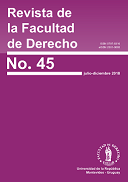Capablanca’s Paradox and Sources of Law
DOI:
https://doi.org/10.22187/rfd2018n45a11Keywords:
Didactic chess, sources of law, teaching metaphorAbstract
There are many stories behind the thirty―two pieces dialectically confronted in the sixty―four squares of the chessboard, many of them closely related to legal thought. The Law is present in chess, becouse imperative rules determine the valid or legal movements of the pieces. Chess is present in Law, becouse Law is a logical and strategic phenomenon. The metaphorical power of chess to explain the legal phenomenon has been reflected in some of the most important texts of Philosophy of law. Acording with that tradition, we will take a fantasy composition by José Raúl Capablanca to reflect on the sources of law and its application to each specific case.
Downloads
References
Atienza, M. y Ruiz Manero, J. (2006). Las reglas de reconocimiento y el valor normativo de la Constitución. Revista Española de Derecho Constitucional, 16(47).
Bobbio, N. (1955). Teoría genérale del diritto (versión en castellano). Barcelona: Debate.
Borges, J. L. (1960). Ajedrez en El hacedor. Madrid: Alianza.
De Otto, I. (1989): Derecho constitucional. Sistema de fuentes. Barcelona: Ariel.
Dworkin, R. (1986). Law’s Empire (versión en castellano: El imperio de la justicia, 1997). Barcelona: Gedisa.
Dworkin, R. (1977). Taking rights seriously (versión en castellano: Los derechos en serio, 1995). Barcelona: Ariel.
Fernández, F. J. (2010). El ajedrez de la filosofía. Madrid: Plaza y Valdés.
Ferrajoli, L. (1995). Derecho y razón. Teoría del garantismo penal. Madrid: Trotta.
García, L. (2013). Ajedrez y ciencia, pasiones mezcladas. Barcelona: Crítica.
Habermas, J. (1998). Factilidad y validez. Madrid: Trotta.
Hart, H. L. A. (1961). The Concept of Law (versión en castellano: El concepto del Derecho, 1980). Buenos Aires: Abeledo Perrot.
Kasparov, G. (2003). Mis geniales predecesores II. Madrid: Merán.
Macedo, R. P. (2016). On how law is not like chess, Dworkin and the Theory of conceptual types. En T. Bustamente y B. G. Fernándes (Dir.) Democratizing Constitutional Law. Berlin: Springer.
Marmor, A. (2006). How Law is like chess. Legal theory. Cambridge: Cambridge University Press.
Morawetz, T. (1973). Commentary: the rules of law and the point of law. University of Pennsylvania Law Review, 121.
Nimzovich, A. (1925). Mi Sistema (ed. en español, 2009). Madrid: La casa del ajedrez.
Nunn, J. (2010). Aprenda táctica de ajedrez. Madrid: La casa del ajedrez.
Nunn, J. (2003). Learn Chess Tactics. Londres: Gambit Publications.
Perán Quesada, S. (2018). ¿Puede aprenderse Derecho jugando al ajedrez?, III Congreso Internacional de Innovación Docente. Universidad de Murcia. 20 y 21 de marzo 2018.
Postma, H. F. (2004). Ajedrez y proceso civil: tácticas y estrategias comunes, En S. Barberío, H. Carrillo y M. García (Eds.) Doctrina y jurisprudencia civil y comercial. Rosario (Arg.): Juris.
Pound, R. (1926). Law and Morals. Oxford: Oxford University Press.
Rawls, J. (2000). Réplica a Habermas. En J. Habermas, J. Rawls. Debate sobre liberalismo político. Madrid: Paidós.
Rawls, J. (1955). Two concepts of rules. The Philosophical Review, 64(1).
Rojas Amandi, V. M. (2006). El concepto de Derecho de Ronald Dworkin, Revista de la Facultad de Derecho de México, 246.
Ross, A. (1958). On Law and Justice, The Lawbook Exchange (versión en castellano: Sobre el Derecho y la Justicia, 2005). Buenos Aires: EUDEBA.
Saidy, A. (1972). La batalla de las ideas en Ajedrez. Madrid: Ediciones Martínez Roca.
Searle, J. (1997). La construcción de la realidad social. Madrid: Paidós.
Zapatero, V., Garrido, Mª. I. (2007). El Derecho como proceso normativo. Lecciones de teoría del Derecho. Alcalá: Universidad de Alcalá.
Published
How to Cite
Issue
Section
License
This journal provides open access to its content, based on the principle that providing the public with free access to research helps a greater global exchange of knowledge
Revista de la Facultad de Derecho. Creative Commons Reconocimiento 4.0 Internacional License.


